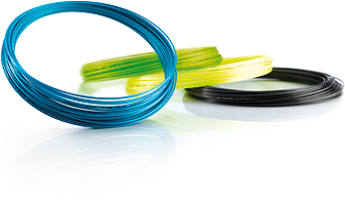Our Tennis Racket Stringing Guide
Choosing a tennis string can be even harder than choosing a tennis racquet. With literally hundreds of different options, it’s tough to know which is the right string for you. Finding a string that works well with your PLAY STYLE and RACQUET will make you more confident in your gear and your game when it’s time to take the court. Correct Stringing can also alleviate or avoid injury during your game.

Strings Based On Play Style
Heavy Spinners
A heavy spin-style player breaks a lot of string. A thicker gauge string and/or a monofilament polyester string will increase durability for this type of player.
Flat Hitters
A flat hitter could use a thinner more feel-orientated type of string due to them imparting less spin, thus breaking less string and not needing the durability that a thicker string provides.
Other Considerations
New Racquets
Many times the old favourite string does not play as well in the new frame you bought. This can be due to a different weight, racquet stiffness, or string pattern.
Injuries
For players who are suffering from tennis elbow or shoulder issues, a softer more elastic string like the natural gut or a multifilament will help and is recommended.
String Tensions and Considerations
Choosing your string tension is as important as choosing your string type. The tension you play with is dependent on the type of courts you play on, the temperatures or altitudes at which you play, or even to reduce injury stress.
Court Surface
On faster surfaces like grass, artificial grass, and quicker hard courts, the ball comes through faster off the surface, therefore requiring higher tension to stay in control.
On slower surfaces like clay and slow hard courts the ball won’t come through as fast and will sit up more, in this case lowering tension will help hit the ball higher over the net and with depth.
Weather
In hotter weather, the ball will fly faster through the air and some control may need to be regained meaning higher tension is needed.
In colder conditions, the ball will move more slowly through the air meaning lower tensions are required.
Locations
When playing tennis at a high altitude it will mean a faster game compared to playing at the coast. Increase tension at high altitudes to help with control at faster speeds.
Coastal play means a slower game, tension may need to be lowered to help with depth and power.
Injuries
If you suffer from an injury, particularly an arm or wrist injury, lowering tension will help reduce stress on the affected part of the body.
The slower swing speed will help the player continue playing with less discomfort.
ERSA Qualified Stringers
Reliable and functioning equipment is the starting point to play most sports. Tennis, badminton, and squash are no different – your racquet is a big investment that needs continual maintenance to give you the best game possible. Stringing your racquet is a big part of that care and it requires specialist knowledge to be done properly. Not sure who to go for the best stringing? Read on to find out why you need an ERSA-certified specialist…
Who is ERSA?
ERSA stands for The European Racquet Stringers Association. The association was created to help educate its members and consumers about the stringing of sports racquets. Founded in 2001, it now boasts over 3,000 members in over 30 countries – these members include racquet specialists, coaches, sporting goods retailers, manufacturers, and racquet sports players. ERSA has expanded its certification to include courses for tennis, badminton, and squash racquets.
Why choose an ERSA accredited stringer?
ERSA accredited stringing specialists have to complete several intensive courses and tests to gain accreditation. In creating these qualifications ERSA has set an industry standard for stringing and racquet knowledge. A poorly strung racquet could destroy your game or even cause you injury – having your racquet strung by an ERSA member guarantees stringing done to the highest standard and no surprises. An ERSA-certified stringer will have a full understanding of racquet service, including re-gripping, weight and balance, installing grommets and string, and how to handle sizing. ERSA helps its members keep their skills on-point and up-to-date by providing workshops, new tests, and the latest information.
ERSA stringing in South Africa
Baseline Racquets are the official testers and certifiers for ERSA in Southern Africa. Our stringers are certified as Pro Stringers and Master Pro Stringers. Want your racquet strung by the best in the business? Visit one of our Baseline Racquets stores or pop us an email at info@baselineracquets.co.za to find out more.
